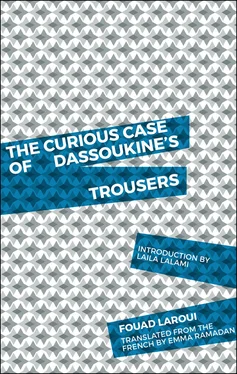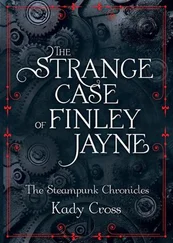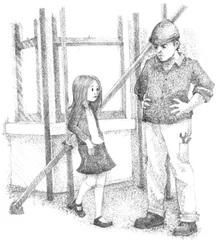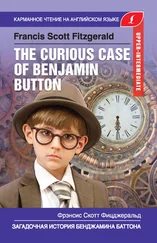“And they say Moroccans don’t know how to plan for the long term?”
“Utter nonsense!”
“That they only live in the moment?”
“Baloney!”
Moved, we looked into each other’s innermost depths, proud to be part of a people so concerned with the future, and we ordered a pomegranate juice to drink to the health of triennial, and even quinquennial, plans.
The waiter insolently asked us if we really intended to sip pomegranate juice after drinking coffee. He seemed to imply that we were sinning against the spirit of the place, against the P*sian custom, against all traditions. We told him to get lost, which he did with a majestic step.
However, the young man was worried. He started up again, in a melancholic tone:
“This story has plunged me into a state close to nervous breakdown. (Yes it has! Yes it has!) To learn first of all that I’m not who I thought I was, which is to say a Rabati; to get used to this new identity as a citizen of Khzazna; then discover that this identity that I had ended up accepting was itself a fiction; and that this fiction was a political manipulation designed by my own family…”
“We cannot be betrayed but by our own.”
With a distracted finger he wiped the bottom of the pomegranate juice lingering in his glass; then he sucked his finger, becoming more and more heavyhearted.
“Well, I wasn’t yet at the end of my troubles. That same night, while I confided the discovery of my precarious stateless state to my uncle Brahim, how did my uncle respond? Comforting words, a fitting hadith , encouragements? Not at all! He pushed me even further into my distress by revealing to me an even more bizarre fact that concerned me as well.”
He squeaked:
“My own uncle!”
“Family, I tell you… But what did he say, exactly?”
“This: ‘My dear nephew, not only were you born nowhere, but, in a certain way, you were never born at all.’ Just like that!”
“Allow me to write that phrase in my notebook.”
“‘My dear nephew, not only were you born nowhere, but, in a certain way, you were never born at all.’ And he went on to recount a detail that everyone had forgotten — except him.”
“Uncles, they forget nothing.”
“It’s important to know that I was born (if we can call it being born) toward the end of December 1973. My father was summoned to a council where he was told the following: ‘My dear Abdelmoula’—did I tell you that my father was named Abdelmoula? — ‘if you declare the birth of your son today, or even tomorrow, he will lug around for the rest of his life a year reduced to a few days. Everyone will think he’s eight years old, when really he’ll only be seven years and five days old. Better to wait for the beginning of the coming year and only then go bother the civil registrar.’”
“Understandable.”
“For close to a week, and while I was wriggling about, innocent, in my diapers, nothing happened. I mean officially . In practice, my family probably slit the throat of some ram, or at least a rooster, and offered plates of couscous to the poor near the mosque; but I didn’t yet exist on paper. In my diapers, yes; but on paper, no. Then, around the 2nd or 3rd of January, my father went triumphantly to announce my birth to the authorities. The authorities, who are used to — the imbeciles — believing the word of citizens, thus noted that a certain X*, son of Abdelmoula Y*, was born in Khzazna January 2nd, 1974.”
“Fake birthplace, fake year! Bravo! You’ve got it all!”
“This avuncular revelation stupefied me. I went stumbling out into the night to wander in the little streets of Rabat. It was gorgeous outside…”
“Let’s stick to the story.”
“The question I was asking myself that night, stumbling in the streets, haggard, the question I’m still asking myself, is: am I really myself if I was born elsewhere and the year before? ”
“Colossal enigma!”
We ordered another fruit juice to better meditate on life’s uncertainties. The young man seemed to have calmed down, now that he had emptied his heart of past resentments, as if the confidence he had taken in What’s-his-name was enough to appease him.
He glanced at the parvis in front of the church S* G* of P*. A tourism van had just unleashed tens of Japanese tourists who were agitating silently. A Comoran was selling hot chestnuts while two Tamils seemed to be surveying the area. A beggar, sitting on the steps of the church, was reaching an alms bowl toward the faithful entering into the house of God.
My one-night companion continued.
“What a truly superb city! I really think I’ll end up becoming a citizen of P*. Let it take as long as it takes. At least that’s an identity.”
He got up and took off, just as civilly as he had approached me, after throwing a crumpled banknote on the table. I remained alone on my banquette.
Not for long: The famous Samir J*, passing by, noticed me through the window, entered the café, and came to join me, hoping I would buy him a drink.
After ordering, I quickly recounted the story I had just heard. J* reflected for a bit, then cried out, slamming his fist on the table, as the citizen of Khzazna had done before him:
“This story proves what I have always believed. Identity problems don’t exist. We create them! ‘Who am I? Where am I going? What am I good for?’”
“‘What state am I wandering in?’”
“Pointless questions! This young man doesn’t realize how lucky he is. It’s easy to say to yourself: oh là là , I was born nowhere, at no time, boo hoo, I’m so unlucky!”
He swallowed a mouthful of beer and continued.
“But the worst is to know precisely where you were born, and when, down to the very second; and despite that to have a doubt . A doubt based on certitude, that’s the worst!”
“‘A doubt based on certitude.’ I don’t understand that at all but it seems totally plausible to me. Allow me to write it in my notebook.”
“I was born in Paris, in Baudelocque. If need be, I could find the room, the bed, the exact place, the stain on the ceiling. As for the day, I know it perfectly. The precise hour, the precise meter, everything is known, archived, fixed for centuries to come. So what?”
He brought his face close to mine, his teeth clenched.
“I don’t know who I am any more than this dandy from Kaza Naza!”
“Khzazna.”
“But at least he can imagine that an identity is possible. He can believe that if he rectifies something, two or three administrative trifles, a number, a name, everything will fall back into place. If he had really been born where the register said, the day it said, then there wouldn’t have been any problem. So he can believe that, potentially, he doesn’t have a problem! So, deep down , he doesn’t have a problem!”
“Bravo! I understood nothing.”
J* shouted (one of his tics):
“However, what I’m saying is simple: identity problems, everybody has them! But they go much deeper than we think!”
“But a minute ago you were bellowing the opposite: ‘Identity problems don’t exist!’”
“It’s the same thing!”
“You’re contradicting yourself.”
“Never! And in any case, I don’t give a damn!”
I shouted even louder:
“Exactly, you old rascal!”
Then a young woman, a brown-hair-and-glasses whom I had crossed paths with two or three times at the Cité Internationale, approached us. She yelled at us:
“Messieurs, you’re making a lot of noise,” she remarked. “People are talking. Heads are turning and a tsss tsss is reverberating through the mink coats. And since you’re mixing French and Moroccan, you’re bringing shame to all of Morocco. And to me, as a result. Because I’m Moroccan…”
Читать дальше












